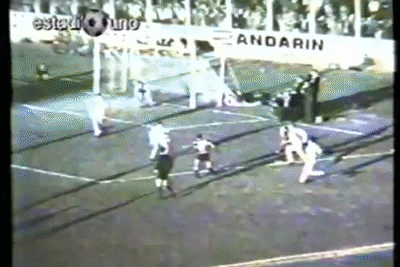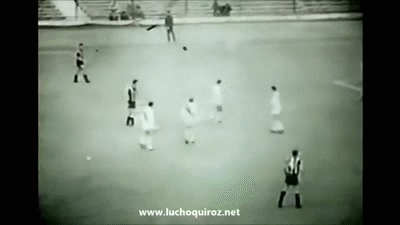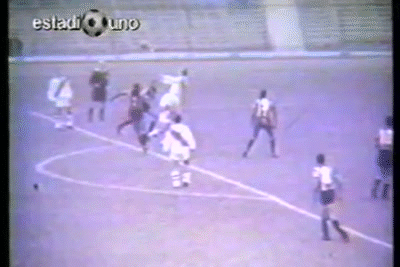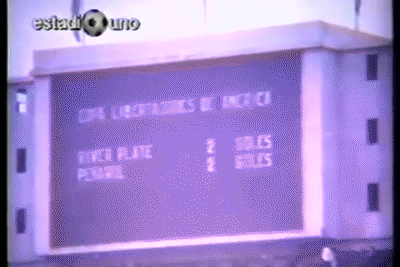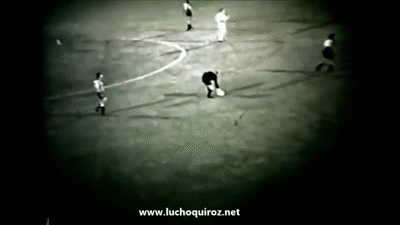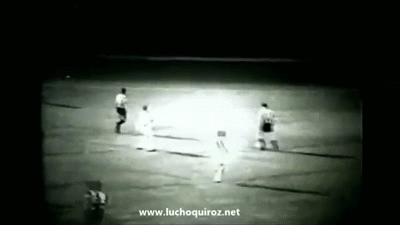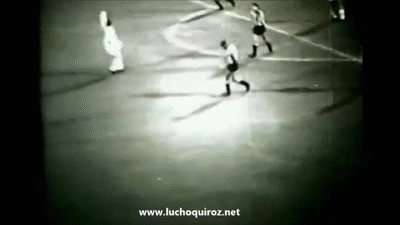WINNING THE PEÑAROL WAY
That Friday, once the adrenalin was gone, Tito’s decision wasn’t looking all that wise. Peñarol started well, in fairness, but River looked fresher and by the end of the first half were 2-0 up. Another Libertadores was slipping away.
The reporter from El Gráfico (an Argie sports journal which feted River players like celebrities) wrote on his scrapbook:
Osvaldo Ardizzone said:
Probably one of the best performances in recent times… With fluid football and ball circulation, River prevailed in every sector. Safe at the back, a strong and creative midfield and an attack with great clarity and offensive instincts. River was the only team on the pitch, we haven’t witnessed such overwhelming superiority in a long time
One of the key problems for that Peñarol side was not having a central midfielder of Teófilo Cubillas’ class. Once they couldn’t counter but had to take the game to another team, their midfield setup was way too deep and defensively focused. Rocha was a #10, not an AM who would carry the ball in transition. They were all used to starting counters from the midfield line, but once the game got stretched there was a huge gaping hole in the middle as Tito was more a passer than a box-to-box ball carrier.
THE HALF-TIME CHANGES
At the time, you could only make subs before the start of the second half (

) so Peñarol took a defender off and brought on a right halfback to beef up the midfield and provide cover for Forlán Sr., who was a pretty average defender but tremendous crosser. With Forlán acting more as wingback than rightback, and well supported, Abbadie could be freed up from the wing and focus on ball-carrying through the middle.
Máspoli was a wily old fox, he knew overconfidence when he saw it, just like he had seen it 16 years ago in the Maracanã. His half-time team talk was simple:
“If we score one, they’ll fall apart”.
At the same time, in River’s changing rooms all they could talk about was their future games with Real Madrid. The first leg was usually in South America, so the Board had promised them a vacation in the South of France after the Intercontinental games. The right back was less bothered and complained of an injury: “I can play another 45, but could be out for a long time after. I don’t want to miss the World Cup”. Unaware of all the changes Peñarol were making, and unaware that prick wouldn’t get called up anyway, the River manager got caught up in the same fantasy world as his players and decided that, since he had the midfield won anyway, he could drop one of them into rightback and bring on another attacking midfielder.
The reporter from El Gráfico would later admit:
"Cesarini [River manager] seemed right, the game was set for a high-scoring win. If at the end of the first 45 minutes anyone had suggested a change in the gameflow, a defeat by River, he would have been considered a comedian or a psychiatric case. River could already toast their first Libertadores Cup”
For the first twenty minutes of the second half, the changes didn’t seem to have made a difference. River were still attacking and Peñarol defending for their lives, so the tweaks to Peñarol’s midfield transition weren’t coming to the fore.
AND THEN CARRIZO feckED IT ALL UP
Amadeo Carrizo was the first South American sweeper keeper. Had Di Stéfano been available I sure would have looked at the ADS-Carrizo-Matosas path into Peñarol. He was a cracking keeper, but will always end up getting picked on in these drafts because there’s the odd game you can savage him. This is one of them.
In the course of a rather innocuous Peñarol attack, finished with a weak lobbed header by Joya, Carrizo changed the course of the game.
He didn’t save it, he chested it upwards, then grabbed it with his hands. Eccentric as he was, he probably didn’t even mean it, just wanted to show some tekkers… but the roar from the Chilean crowd said it all.
It was cheeky, it was disrespectful and had Peñarol raising its head like a fighting cock.
The Clarín reporter wrote:
“it was a minor thing, but so crudely offensive for his rivals, so patronizing, that for the Peñarol players and fans it was like skewering them with burning flags, wetting their ear (SAM expression), referring to their mothers sex lives, and giving them a kick up the backside, all in one”.
Spencer, Tito and Abbadie went up to Carrizo and made their feelings known.
“He didn’t answer. That was a good symptom”, Spencer remembered. Tito continued with the intimidation screaming out loud from midfield to make sure he heard him: “Pepper the box with crosses! Let’s put it up there and when he comes out we all challenge him for the ball. Alberto, Juan, Pedro… you hear me?”. Lito Silva, a sub, scurried onto the pitch and camped behind the goal for the rest of the half letting Carrizo know
“Si no ganamos este partido te cago a patadas” (if we don’t win I’ll kick your arse).
In fairness to Carrizo, he was River’s best player for the remainder of the game, but the incident had a huge effect on the morale of both camps.
It wasn’t just the Peñarol players being up for it and the crowd behind them, but the younger River players suddenly realising they were walking among giants of the game. They disappeared from the pitch, at times it seemed only Carrizo was trying to win it. River fans go as far as saying Matosas and Cubilla stopped playing because they felt personally insulted.
River’s President had a different take after the game:
“I thought we would lose the game when I saw the subs, that’s on the manager. But what this fella has done is inexplicable. When one goes on a windup he must be a man to face the consequences. It’s easy to goad when it’s all going great, but you have to know how to stand alone in adversity. He is responsible for the reaction of those negros (sic) and getting the crowd rooting for them. When he chested that ball he changed the game. A serious professional can’t do those silly things. Gatti has a bad game and we bench him, yet he has been here at River for twenty years and what has he won?”.
THE COMEBACK
Five minutes later Tito gets his chance, a free kick about 40 yards from goal:
Tito Gonçalves said:
I always took those. Spencer and Joya easily gained a yard advantage on a sprint, so I just lobbed it over the wall and onto their paths. It wasn’t as clear here as River hadn’t got organised yet, but I saw Alberto and knew he could nail it
Picture is blurred so another for Spencer's finish:
Osvaldo Ardizzone from El Gráfico said:
Great goal, and the drama begins. What looked like a threat is now a crisis. Peñarol are only a goal away and go for it. River have handed over the initiative and it’s all of Peñarol in attack and River with their backs against the wall. Abbadie is no longer hugging the line but bursting through the middle like a lawnmower. Gonçalves on the halfway line pushing them all forward. Rocha further up… You can start sensing the difference in physical weight. The spiritual difference. One team that grows taller and another that shrinks like a cheap jersey. Every ball going into the box has a whiff of goal.
And then Rocha is on the ball, Rocha to Spencer, Spencer to Joya, Joya to Rocha who doesn’t enter the box but backheels it out. Looks like Arsenal this FFS… Abbadieeeeeeeee, gool, goool, goooooooooool. A fierce drive that deflected off Matosas, leaving Carrizo flat-footed.
Abbadie equalises
For the remainder of the second half Spencer was on the prowl, nicking balls the moment a River defender let it bounce, Rocha launched tremendous rockets, Tito marshaled the troops, Forlán pivoted with Abbadie on the overlap and peppered the box with crosses for “the two negros” to terrify the River defenders. Lito Silva carried on cussing Carrizo behind the goal.
Ardizzone said:
It’s over. The game is gone. The Cup is gone. Gone is the first half and River’s superiority. All that remains is the reality of this draw, the exuberance of Peñarol amid a River that already cries over this catastrophe.
Then
Gonçalves again fools a River in disarray, screaming instructions and finger-pointing at Spencer and Joya before a free kick... only to pass it sideways for Forlán to run freely down the flank and cross. Three of the River back four had scampered back into the box and jumped in unison, but between them
rose the splendid, imperious, feline agility of Alberto Spencer who just twatted the ball towards Carrizo’s far post. 3-2.
Peñarol's third, Spencer's second. Bizarrely, only @Brwned ever drafted him.
River was broken. Then a ball is recovered, gets passed around to Cortés, then Tito, Spencer makes a run, Joya makes his, the defenders follow them…
so all Tito has to do is find the man everyone seemed to have forgotten to keep an eye on: Pedro Virgilio Rocha.
Rocha puts an end to it after Tito's cross.
4-2, and it could have been more as there was still time for Carrizo to foul Spencer running through on goal not once but twice without getting sent off or punished.
So Peñarol won their third Libertadores and second Intercontinental Cup later that year. As for River and their French Riviera dreams, a week later the Banfield supporters presented them with a hen with a red stripe. Nacional were already called “gallinas” in Uruguay, it was about time the nickname crossed the River Plate.
 I think I only changed my mind as our pick was coming up.
I think I only changed my mind as our pick was coming up.






